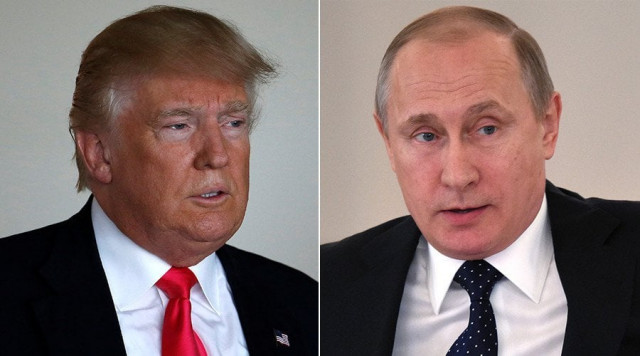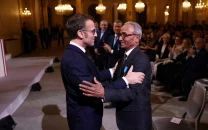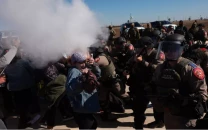Trump admin tried to roll back Russia sanctions immediately after taking power: report
Senior Obama State Department officials, senators from both parties flexed their muscles to keep the sanctions intact

US President Donald Trump (L) and Russian President Vladimir Putin. PHOTO: REUTERS
Immediately after taking power, the Trump administration began a push to normalise relations with Russia, which holdovers from the Obama administration fought tooth and nail to avoid.
A report published by Yahoo News on Friday cites multiple sources familiar with the events as saying that top Trump administration officials, almost as soon as they took office, “Tasked State Department staffers with developing proposals for the lifting of economic sanctions, the return of diplomatic compounds, and other steps to relieve tensions with Moscow”.
The efforts to relax or remove punitive measures imposed by President Barack Obama in retaliation for Russia’s intervention in Ukraine and meddling in the 2016 election alarmed the State Department officials, who immediately began lobbying congressional leaders to quickly pass legislation to block the move.
UK's Nigel Farage a 'person of interest' in Trump-Russia investigation
“There was serious consideration by the White House to unilaterally rescind the sanctions,” said Dan Fried, who was serving as chief U.S. coordinator for sanctions policy until he retired in late February. He said that right after the Trump team came to power, he received several “panicky” calls from government officials who told him they had been directed to develop a sanctions-lifting package. “Please, my God, can’t you stop this,” he quoted them as saying.
Fried said he contacted Capitol Hill allies including Sen Ben Cardin, a Democrat and the ranking minority member on the Senate Foreign Relations Committee, to urge them to quickly pass legislation to “codify” existing sanctions, making it harder for President Trump to remove them.
Tom Malinowski, the assistant secretary of state for human rights under Obama, told Yahoo News that he joined the effort to lobby Congress after learning about the same plans from former colleagues. He had also heard that they had been tasked with arranging a summit between Trump and Russian President Vladimir Putin as part of an effort to achieve a “grand bargain” with Moscow. “It would have been a win-win for Moscow,” said Malinowski, who, only days before he left office, announced his own round of sanctions against senior Russian officials for human rights abuses under a law known as the Magnitsky Act.
The previously unreported efforts by Fried and others to check the Trump administration takes on new significance for investigators in light of reports that before the administration took office, Trump’s son-in-law Jared Kushner and his chief foreign policy adviser Michael Flynn discussed setting up a private channel of communications with Russian Ambassador Sergey Kislyak.
Departure of communications aide could be first in Trump shake-up
A senior White House official confirmed that the administration began exploring changes in Russia sanctions as part of a broader policy review that is still ongoing.
Just days after Trump took office, officials who had moved into the secretary of state’s office sent a “tasking” order to the Bureau of European and Eurasian Affairs to develop a menu of options to improve relations with Russia as part of a deal in exchange for Russian cooperation in the war against the Islamic State in Syria, according to two former officials. Those options were to include sanctions relief as well as other steps that were a high priority for Moscow, including the return of two diplomatic compounds — one on Long Island and the other on Maryland’s Eastern Shore — that were shut by President Obama on Dec. 29 on the grounds that they were being used for espionage purposes.
The lobbying effort produced some immediate results: On February 7, Cardin and Sen Lindsay Graham introduced bipartisan legislation to bar the administration from granting sanctions relief without first submitting a proposal to do so for congressional review.
The proposed bill lost some of its urgency six days later when Flynn resigned as White House national security adviser following disclosures he had discussed political sanctions relief with Kislyak during the transition and misrepresented those talks to Vice President Mike Pence.



















COMMENTS
Comments are moderated and generally will be posted if they are on-topic and not abusive.
For more information, please see our Comments FAQ